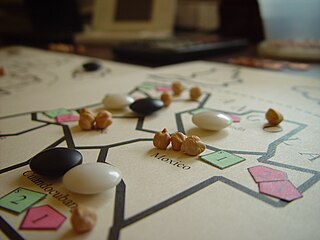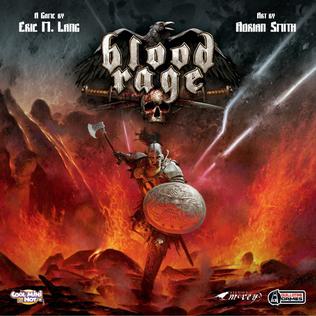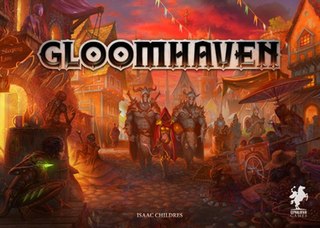Related Research Articles

Board games are tabletop games that typically use pieces - moved or placed on a pre-marked board and often include elements of table, card, role-playing, and miniatures games as well.

A gamemaster is a person who acts as an organizer, officiant for regarding rules, arbitrator, and moderator for a multiplayer role-playing game. They are more common in co-operative games in which players work together than in competitive games in which players oppose each other. The act performed by a gamemaster is sometimes referred to as "Gamemastering" or simply "GM-ing".

A Eurogame, also called a German-style board game, German game, or Euro-style game, is a class of tabletop games that generally has indirect player interaction and abstract physical components. Eurogames are sometimes contrasted with American-style board games, which generally involve more luck, conflict, and drama. They are usually less abstract than chess or Go, but more abstract than wargames. Likewise, they generally require more thought and planning than party games such as Pictionary or Trivial Pursuit.

A live action role-playing game (LARP) is a form of role-playing game where the participants physically portray their characters. The players pursue goals within a fictional setting represented by real-world environments while interacting with each other in character. The outcome of player actions may be mediated by game rules or determined by consensus among players. Event arrangers called gamemasters decide the setting and rules to be used and facilitate play.

A role-playing game is a game in which players assume the roles of characters in a fictional setting. Players take responsibility for acting out these roles within a narrative, either through literal acting or through a process of structured decision-making regarding character development. Actions taken within many games succeed or fail according to a formal system of rules and guidelines.

A wargame is a game that realistically simulates warfare, as opposed to abstract games such as chess. Wargaming may be played for recreation, to train military officers in the art of strategic thinking, or to study the nature of potential conflicts. Many wargames recreate specific historic battles, and can cover either whole wars, or any campaigns, battles, or lower-level engagements within them. Many simulate land combat, but there are wargames for naval and air combat as well.

A strategy game or strategic game is a game in which the players' uncoerced, and often autonomous, decision-making skills have a high significance in determining the outcome. Almost all strategy games require internal decision tree-style thinking, and typically very high situational awareness.
In tabletop games and video games, game mechanics are the rules that govern and guide the player's actions, as well as the game's response to them. A game's mechanics thus effectively specifies how the game will work for the people who play it.
BoardGameGeek (BGG) is an online forum for board gaming hobbyists and a game database that holds reviews, images and videos for over 125,600 different tabletop games, including European-style board games, wargames, and card games. In addition to the game database, the site allows users to rate games on a 1–10 scale and publishes a ranked list of board games. According to Brett Boge, the website...

Twilight Imperium is a strategy board game produced by Fantasy Flight Games. It was designed by Christian T. Petersen and was first released in 1997. The game is in its fourth edition (2017), which has large changes over previous editions. It is known for the length of its gameplay, and its in-depth strategy.

Twilight Struggle: The Cold War, 1945–1989 is a board game for two players, published by GMT Games in 2005. Players are the United States and Soviet Union contesting each other's influence on the world map by using cards that correspond to historical events. The first game designed by Ananda Gupta and Jason Matthews, they intended it to be a quick-playing alternative to more complex card-driven wargames.

A board wargame is a wargame with a set playing surface or board, as opposed to being played on a computer or in a more free-form playing area as in miniatures games. The modern, commercial wargaming hobby developed in 1954 following the publication and commercial success of Tactics. The board wargaming hobby continues to enjoy a sizeable following, with a number of game publishers and gaming conventions dedicated to the hobby both in the English-speaking world and further afield.

A game is a structured form of play, usually undertaken for entertainment or fun, and sometimes used as an educational tool. Games are different from work, which is usually carried out for remuneration, and from art, which is more often an expression of aesthetic or ideological elements. However, the distinction is not clear-cut, and many games are also considered to be work or art.

A tabletop role-playing game, also known as a pen-and-paper role-playing game, is a form of role-playing game (RPG) in which the participants describe their characters' actions through speech. Participants determine the actions of their characters based on their characterization, and the actions succeed or fail according to a set formal system of rules and guidelines. Within the rules, players have the freedom to improvise; their choices shape the direction and outcome of the game.
GameTable Online was a popular web game portal that specialized in online adaptations of board, card, and dice games. Their game platform offered both head-to-head play against other players or computer opponents for single player mode, including such games are checkers, chess, hearts (game), and Axis & Allies. There was a mix of free and "Premium" games. The "Premium" games were the most popular, and to play those against other humans required an activation fee per game title.

Game design is the art of applying design and aesthetics to create a game for entertainment or for educational, exercise, or experimental purposes. Increasingly, elements and principles of game design are also applied to other interactions, in the form of gamification. Game designer and developer Robert Zubek defines game design by breaking it down into its elements, which he says are the following:

An Amerigame, short for American-style board game, is a loose category of tabletop game that generally features a prominent theme, encourages direct conflict between players, and has a significant degree of luck. It is distinguished from a Eurogame, or German-style board game, in that American-style games often have longer playtimes and mechanics designed to suit the theme. Not all games from the United States fall under this category. Many of the famous games were invented outside USA. Party games like Codenames, Cooperative board games like Pandemic and Family-friendly board games with simpler or abstract rules like Scrabble and Chess are usually excluded.

Blood Rage is a Viking themed board game designed by Eric Lang and published by CMON Limited in 2015. Each player controls a clan of mythological Vikings seeking glory as Ragnarok approaches. Played in three ages or rounds, Blood Rage features card drafting, battles and territory control via forces represented by sculpted plastic miniatures. All conflicts are resolved through playing cards, and cards are also used to improve and differentiate the different clans and the leaders, warriors, ships and monsters at their command.

Gloomhaven is a cooperative board game for 1 to 4 players designed by Isaac Childres and published by Cephalofair Games in 2017. It is a campaign-based dungeon crawl game including a narrative campaign, 95 unique playable scenarios, and 17 playable classes. Since its introduction the game has been acclaimed by reviewers, and has been described as one of the best board games made to date.
A roguelike deck-building game is a hybrid genre of video games that combine the nature of deck-building card games with procedural-generated randomness from roguelike games.
References
- ↑ Woods, Stewart (August 16, 2012). Eurogames: The Design, Culture and Play of Modern European Board Games. McFarland. p. 221. ISBN 978-0786467976.
- 1 2 Costikyan, Greg (August 12, 2011). "Boardgame Aesthetics". In Davidson, Drew (ed.). Tabletop: Analog Game Design. lulu.com. pp. 179–185. ISBN 978-1257870608.